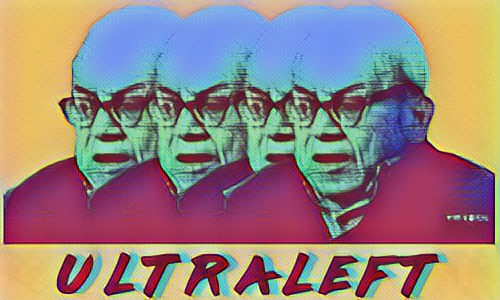Pragmatic Anarchism
Anarchist rejection of authority has application in epistemology and in philosophical and literary theory. One significant usage of the term shows up in American pragmatism. William James described his pragmatist philosophical theory as a kind of anarchism: “A radical pragmatist is a happy-go-lucky anarchistic sort of creature.” James had anarchist sympathies, connected to a general critique of systematic philosophy. Pragmatism, like other anti-systematic and post-Hegelian philosophies, gives up on the search for an arché or foundation, underlying principle, source of action, method of government.
Anarchism thus shows up as a general critique of prevailing methods. An influential example is found in the work of Paul Feyerabend, whose Against Method provides an example of “theoretical anarchism” in epistemology and philosophy of science. Feyerabend explains: “Science is an essentially anarchic enterprise: theoretical anarchism is more humanitarian and more likely to encourage progress than its law-and-order alternatives.” His point is that science ought not be constrained by hierarchically imposed principles and strict rule following.
Pragmatism does not regard any of reality as “unknowable” in principle. A hypothetical aspect of reality that cannot affect our experience in any way whatsoever, directly or indirectly (e.g. by an electron microscope), would never be real for us. But reality is infinitely complex and infinitely large, while we are limited. We can never know all of reality or all about any part of reality, beyond any possibility of being wrong. We have no “God’s eye view” of the world. For us there is no “absolute truth.” (Accepting that we may be wrong about anything is “fallibilism.” But pragmatism rejects the idea that we cannot know anything at all, which it calls “skepticism.”) All we can know about anything is to create the best, most “truthful” belief—to produce enough evidence to make a “warranted assertion.”
Central to pragmatism is the idea of “lived experience,” or active experience. Experience does not exist in our heads or in our bodies but in the active interaction (or transaction) between our selves and the world. We act on the world and it acts on us. Our actions change the world, as it changes us. We experience our actions and their consequences. “Actions” include touching and moving things as well as looking and thinking about things. Our experience is not a passively mirrored reflection of external reality (according to a crude “correspondence” theory of truth). Rather it is an active creation of sensations, pictures, models, and operations which we use to cope with reality. Faced with some problem, we have to work out a way to solve the problem, by enquiry. We may rely on those things which are not problematic at this time, develop hypotheses as to how to deal with those that are, and then act on the problem to see if our hypothetical solution will resolve the uncertainty. This is a “scientific” approach to enquiry, although not literally using the exact same techniques of physics or chemistry in solving social difficulties.
For example, if I look at a valley from a hilltop, I may have a road map of the region, or a realtor’s map of property boundaries, or a geologist’s map of raw materials, or a topographic map of land heights, or a painting of the valley in the sunset as it appeared to an artist. Which one “represents” the valley in “truth”? They all do, depending on my purposes, whether I want to drive somewhere or buy a house or dig a mine or have an aesthetic experience. They are instruments of satisfying my needs, reaching my goals, and realizing my values, and therefore resolving my problems. They were each made through someone’s actions (including measuring and digging, or painting). They may be checked for accuracy by my further actions (such as driving on the roads or digging for minerals).
Our experiences are never just between us and the physical environment. They are social. We could not think without the language and concepts that came from our cultural environment. Our experiencing is communal, as is that of science. Like scientists, we do best when we can exchange ideas and experiences, share thoughts, and argue out competitive solutions. Enquiry is social and works best when cooperative.
Pragmatism is a commitment to this idea of cooperative enquiry and experiencing in all areas. This is the ground for its belief in participatory democracy. It rejects rule by “enlightened” experts. The more that the people themselves are directly involved in working together to develop their culture and satisfy their needs, in pooling their experiences, the better they will do. This means a pluralistic openness to the experiences of the marginalized, the outcaste, and the oppressed: the working class, African-Americans, women, LGBTQ community and others.
Pragmatism distinguishes between “democracy” as an ideal to be striven for and “democracy” as a label—and not a very accurate one—for the existing state. Similarly there is a distinction between “democracy” as the machinery of a state and “democracy” as a way of life, something which pervades every aspect of a society: its politics, its culture, its religion, its economy, and its relationships.
The basis of pragmatism has sometimes been formulated as “The truth (or the good) is what works.” To pragmatists, this does not mean that “the truth” is what makes us feel good in the short term, or that “the good” is what is immediately expedient. By “works,” it means works overall, over time, and for a community of enquirers. Nor does the formula mean that there is no objective reality. Exactly the contrary. A hypothesis can only be said to work if it somehow matches with independent reality. A key can only work to open a lock if it fits the lock, which does not mean that it looks like (or “represents”) the lock.
All our values are never in question at once. Basing ourselves on those values we are not questioning at this time, and on whatever facts are relevant to the situation, people can do the same as with other problematic situations: work out hypotheses, and then act on them to see if they can resolve moral problems. This is analogous to Nietzsche’s “transvaluation of values.”
From this perspective, means and ends interpenetrate. Ends “justify” means, but only if the means really lead to the desired end (the “end-in-view”) and do not have negative side products (other, unwanted, consequences). In other words, we must value out the means by how well it achieves our end in light of inevitable side effects that will also challenge our values.
In his last decade, William James came to identify himself as an anarchist. In his 1907, Pragmatism, publically published, he declared that there were two types of people with attitudes toward “government, authoritarians and anarchists.” He went on to criticize the “airy and shallow optimism of current religious philosophy” by referring to the work of a well-known radical who had championed the homeless and unemployed: “that valiant anarchistic writer Morrison I. Swift. Mr. Swift’s anarchism goes a little farther than mine does, but I confess that I sympathize a good deal…”
He wrote to a number of friends saying that he was an anarchist. “I am becoming more and more an individualist and anarchist and believer in small systems of things exclusively...I am getting to be more and more of an anarchist myself, in my ideas.” He suggested that anarchists set up communities to demonstrate the value of cooperative living. Deborah Coon concludes that James had in mind a “pacifist, communitarian anarchism, strongly individualist, but holding community to be important.” James developed his anarchism in the same period in which he became active in the Anti-Imperialist League, which opposed the US war with Spain and the brutal US invasion of the Phillipines. (Mark Twain and other prominent intellectuals were also involved in the Anti-Imperialist League.) He developed a strong dislike for “bigness”: big government, big corporations, and big military actions. Instead he advocated individualism and decentralization, which fit anarchism.
Pragmatic anarchism means praxis. One is not beholden to any one ideology but instead is deeply involved in the act of self-governing. This self-governance means non-governance. When everyone is truly liberated to pursue the truth that “works” for each within a community of enquirers, the freedom of one enhances the freedom of all and vice versa.




Comments
Post a Comment